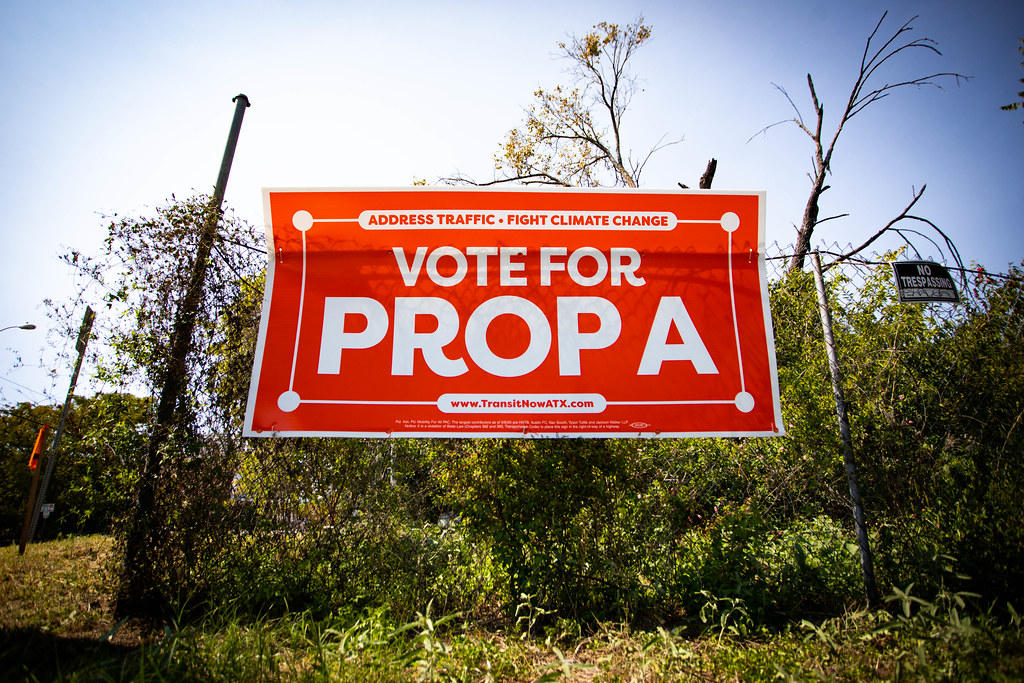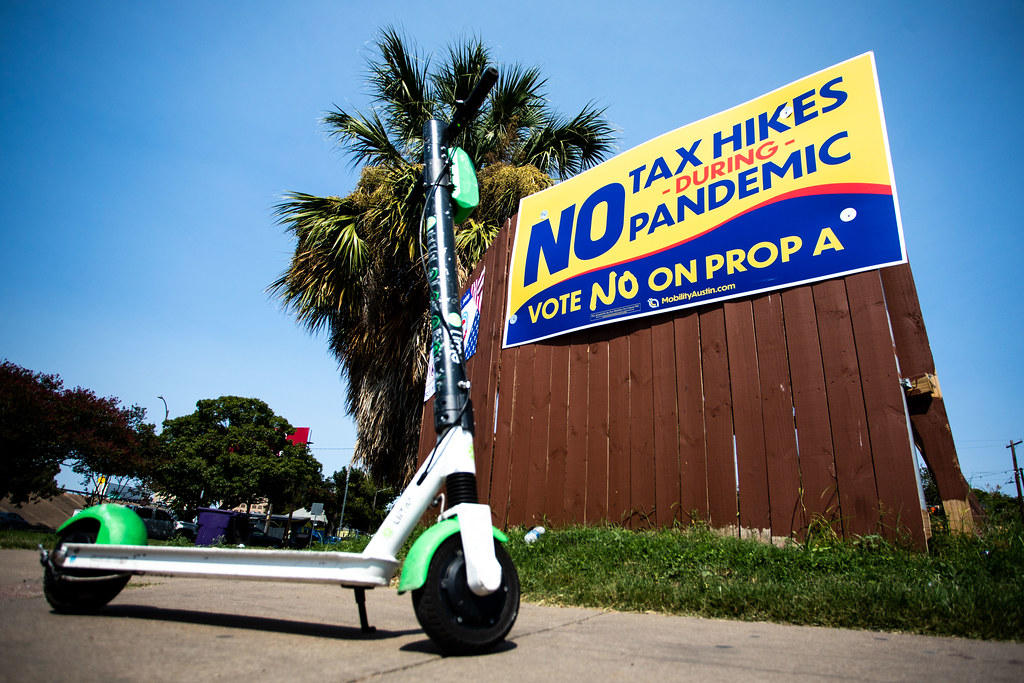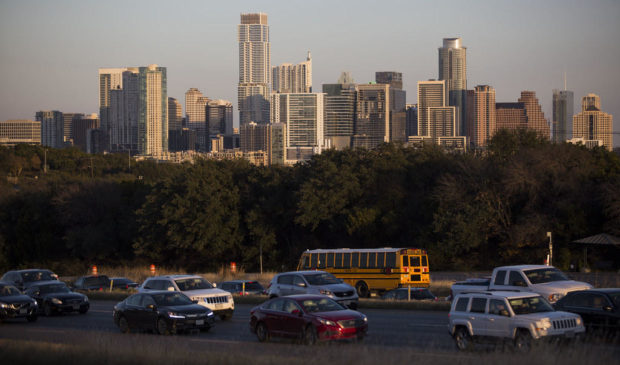Photo by Credit Gabriel C. Pérez / KUT
Here’s where Austin City Council candidates stand on the transportation ballot measures
Friday, October 9, 2020 by
Samuel King KUT and the Austin Monitor wrapped up a series of forums this week with the candidates for five City Council seats. Among the issues discussed were the candidates’ stances on two transportation-related ballot measures.
Proposition A asks voters to raise property taxes to help pay for Project Connect, the transit expansion plan. Proposition B would authorize the city to borrow money to pay for street upgrades, new bikeways and urban trails, as well as continue to build out or repair the city’s sidewalks.
The views from Council candidates on the propositions reflected the debate happening citywide. If they pass, Council will have a role in shaping how the funding created by the propositions is distributed. The funding and implementation of Project Connect would be overseen by a new local government corporation, the Austin Transit Partnership.
The five-member board would be made up of a member from both City Council and the Capital Metro board. Both bodies would also have to approve the other three members: experts on finance, engineering and construction, and community planning and sustainability.
Council would also be involved in discussions about how to use $300 million in funding to help prevent any new development along the transit lines from forcing people out of their neighborhoods.
Here’s what the candidates had to say about the propositions.
The only open seat on the Council is District 2, which covers Southeast Austin. Mayor Pro Tem Delia Garza, who is also vice chair of the Capital Metro board, is leaving Council to become Travis County attorney.
Under the Project Connect initial investment plan, the proposed Orange Line train would end close to the district’s western boundary at Stassney and Congress, while extended MetroRapid limited bus stop service would run down to Southpark Meadows.
The Blue Line would run to Austin-Bergstrom International Airport, which is in District 2. There would also be a new MetroRapid bus line along Pleasant Valley Road. Multiple neighborhood circulators, like Capital Metro’s Pickup service, would serve several areas across the district.

Supporters of Proposition A, which would add a new property tax to pay for Project Connect, say investing in transit now will save money in the future. (Credit Gabriel C. Pérez/KUT)
Two candidates, Vanessa Fuentes and David Chincanchan, support Proposition A, while Casey Ramos and Alex Strenger are opposed.
Chincanchan: “For me, transportation, especially public transit, isn’t just (about transit). It’s about social justice and it’s about access to opportunity. It’s about whether people can access employment centers, schools, health centers, grocery stores. … And in Austin, investing seriously in a transit system that serves folks who are transit-dependent or working families is long overdue. And if we don’t act now, it’s only going to get more expensive, more costly to do this in the future.”
Fuentes: “In our district, the western portion of District 2 will benefit immensely from Project Connect. However, I do not think Project Connect is good enough for our southeast quadrant of our community and especially for our community in Del Valle. We need to see more access to rail and service spots in Del Valle, and I call upon our county leaders and Cap Metro to ensure equity in transit and make sure that we get equitable service to our Southeast Austinite residents.”
Ramos: “What I propose is just adding more bus lines. For a billion dollars, we could add bus lines to make sure our bus routes come every five minutes and have twice as many bus routes in each neighborhood. And on top of that, we could have supplemental transportation, smaller metro vehicles that are going back and forth from bus stops and neighborhoods that are taking people like the elderly, pregnant women, children to (services) in their neighborhoods.
Strenger: “We’re already making great advancements with electric vehicles and they’re going to be a lot more affordable by the time this happens. So, you know, by the time this rail gets built, it’s not even going to be useful. And then you factor in that more and more people are working from home as a result of the pandemic. We’re not going to get what we pay for when it comes. It’s not a good use of money.”
Council Member Greg Casar is running to hold on to his District 4 seat, which covers parts of North and Northeast Austin. Portions of the Red Line already serve District 4, and both the Blue and Orange lines would run near the western boundary of the district. The Gold Line, which would initially be a bus line with its own dedicated lanes, would also run through parts of the district. Casar supports Prop A, as does opponent Ramesses II Setepenre. Louis Herrin III is against it.
Casar: “We could actually have a real mass transit system that we deserve that is fully electric, that gets you in the middle of rush hour. … You won’t have to sit in traffic and can get downtown from District 4 in 20 minutes and out to the airport, not that much longer than that. That’s what a big city needs. It’s badly what our essential workers need, and it’s the right thing for our city to do.”
Setepenre: “The principal reason why I live in Crestview Station is that I have access to a MetroRail, as well as express buses. And for years I used to take the Metro buses. However, the train was the fastest route downtown and elsewhere because it doesn’t stop. So yes, I’m in favor right now. However, I do have reservations about the funding of it, and I don’t have high hopes of it being passed by taxpayers.”
Herrin: “I am against the way Proposition A is, and it’s more because the way they’re feeding it to us. They’re saying that the federal government is going to pay for it. There is no commitment the federal government is going to pay a dime. I look at the way it kind of disrupts traffic. I don’t see a large percent of people using it.”
Incumbent Jimmy Flannigan has been a big proponent of transit, often tweeting about his commutes on the MetroExpress buses. So his support of Project Connect is no surprise. Upgrades to the Red Line, which runs through the district, would be among the work completed under Project Connect. The plan includes more park-and-rides in the district, as well as new MetroExpress commuter bus routes.
His opponents in the race, Dee Harrison, Mackenzie Kelly and Jennifer Mushtaler, are all opposed.
Flannigan: “I worked hard representing the city and the district and the region to ensure that we had a plan that was built for the future. We have not seen a plan like this come before the Austin voters, and it provides a level of infrastructure that is a multigenerational investment for the future.
“The funding mechanism is innovative. It will help solve the problem that other communities have failed where you don’t fund the future maintenance and operations that’s taking care of. And an independent board (will) oversee the project, so we can eliminate politics from those future decisions.”

Opponents of Prop A say raising taxes will hurt families who are struggling during the pandemic. (Credit Gabriel C. Pérez/KUT)
Harrison: “All the data that was gathered that went into the making of Project Connect was gathered before Covid. Right now, we’re seeing a monster change in the way people work and the way they move around. Everybody’s working from home. We’re gonna have a lot of business, a lot of businesspeople who say we can continue to do that. Some people will not be able to work from home. And those are the people we need to address. But our data is skewed. Our data at this point is wrong because of the impact of Covid-19.”
Kelly: “I don’t support Project Connect in its present form. It doesn’t offer much of anything to D6. In fact, we could help solve problems with transportation dead-zones with different bus routes being placed throughout the district, better than we can serve our people here with Project Connect. It shouldn’t be financed with property taxes. It’s way too expensive and the economy is in a serious recession.”
Mushtaler: “It’s on the ballot for the voters to decide. I definitely have concerns with Project Connect. … There’s a lot to consider here. As far as District 6 is concerned, I think the incumbent failed to advocate for us. We really didn’t get much out of this project at all.”
Both participants in the District 7 forum strongly support Project Connect. Council Member Leslie Pool is facing Morgan Witt.
Orange and Blue line train stops would serve the district, with MetroRapid bus service continuing up to Tech Ridge. The proposed Burnet MetroRapid line would also serve parts of the district. The expansion in MetroRapid service would be one of the first projects completed under the plan.
Pool: “I do support Project Connect and Prop A, and there are three elements to it. It’s the system plan; it’s the governance structure; and it’s the financing scheme, which is the 8.75 pennies that you talked about. (Prop A asks voters to raise property taxes by $0.0875 per $100 of valuations, or roughly $538 yearly on a home valued at $500,000.)
“I want to point out that some people are misreporting the increase in taxes. The tax rate is going up 25 percent, but your taxes are not going up 25 percent. And that’s because the city of Austin is just one of five taxing entities. And our share’s about 22 to 23 percent of the total bill. And we all know that AISD has the lion’s share of over 50 percent.”
Witt: “In District 7 specifically, we have a lot of communities in the northern areas around Tech Ridge, Palmer and Lamar, but even farther south along the Burnet corridor where we need more public transit infrastructure, especially on the outer limits of the city. Those people tend to rely more heavily on public transportation and have the least amount of access to it. But if we are also going to do this effectively, we need to make sure that we build our housing around it so that people are connected to the transportation that they’re using and are incentivized to use it.”
Besides District 6, the most skepticism about Project Connect and Prop A came from the candidates in District 10. It’s understandable, as both have some of the least densely populated areas in the city, with topography that can make transit challenging.
None of the new proposed rail lines would run in the district, but there would be two new park-and-rides, as well as new MetroExpress commuter services. There would also be additional neighborhood circulators, which Capital Metro says can serve as an alternative in areas not conducive to traditional bus lines.
While incumbent Alison Alter and challenger Pooja Sethi are in support of Project Connect, the other three candidates who took part in the KUT forum – Belinda Greene, Ben Easton and Robert Thomas – are against it.
Alter: “It took me about three years of working many hundreds of hours on it, but I believe it provides the comprehensive system that the previous ballot initiatives lacked. It provides a financing mechanism that allows us to be transparent with a tax rate election, which will cost less than bonds.
“And I believe that this is a time to move forward, to address congestion, to address climate change, to be true to our equity goals and to provide jobs. … But it is up to the voters. And if the voters choose not to, then we will have to come up with another plan.”
Easton: “I don’t trust Prop A. No, I’m going to vote against it as a citizen and I wouldn’t support it. So I don’t trust a city bureaucracy that can’t even keep e-scooters and driving bars, bicycle bars down the street. If you want open transportation, then pay attention to the little stuff.”
Greene: “You know, they say 45 percent of it will be federally funded. But that’s not guaranteed yet. We don’t know that it will be fully federally funded.”
Sethi: “I support Prop A. And I also support the opportunity this November to ask District 10 residents what they want to invest in, what we want to invest in as a district. And I understand for many of our District 10 residents to pay taxes for a system that doesn’t fully run through the district is a tall order. But I also know that we need a transportation plan in Austin that gets congestion off of our roads and out of our neighborhoods and gets people to work, gets kids to school and gets our residents to health care.”
Thomas: “I do not believe that Prop A was well thought out. You know, I’ve looked at it extensively. I’ve researched it. I’ve read it. I’ve looked at all of the literature. I’ve been following it over time. And the reality is yet once again, this is another version of the Red Line from Leander. … The mayor is indicating that there’s going to be federal funds that are going to be matching. That’s just not true. You can’t promise that. The bottom line is it does too little and it’s irresponsible.”
Note: Capital Metro is pointing to several projects across the country that have received federal funding in the past few years. A light rail project in Minneapolis received the green light a few weeks ago. Capital Metro has already started the process to obtain federal funding for the MetroRapid extension.
Proposition B
Proposition B, which would fund infrastructure improvements, also came up at a few of the forums.
District 4 Council Member Casar supports the proposal. His opponents, Setepenre and Herrin, were generally supportive, but expressed mixed feelings.
“One of the things I hear most from community members and constituencies is, why don’t we have sidewalks in Austin?” Casar said. “And it’s because for too long we haven’t put together the funding and put the things on the ballot to make it so that our neighborhoods have the basic amenities that we deserve.”
Both District 7 candidates support Prop B, while support varied in District 10. Alter joined some of her opponents in objecting to the process that led to the proposition, but said the investments are needed.
Others, like Robert Thomas, opposed it altogether.
“Look, the reality is we still have so much bond money that is dedicated to transportation that has not been spent. We can do so much that’s in Prop A and Prop B in existing bonds that we’ve already approved,” Thomas said.
Voters will have their chance to weigh in on the Council races and the transportation propositions soon. Early voting begins Tuesday.
This story was produced as part of the Austin Monitor’s reporting partnership with KUT.
The Austin Monitor’s work is made possible by donations from the community. Though our reporting covers donors from time to time, we are careful to keep business and editorial efforts separate while maintaining transparency. A complete list of donors is available here, and our code of ethics is explained here.
You're a community leader
And we’re honored you look to us for serious, in-depth news. You know a strong community needs local and dedicated watchdog reporting. We’re here for you and that won’t change. Now will you take the powerful next step and support our nonprofit news organization?








